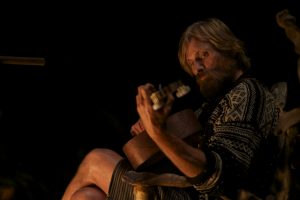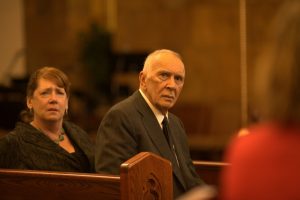With Captain Fantastic, actor turned Director Matt Ross enlists the help of Viggo Mortensen to tell the story of a survivalist father forced to face up to reality when his back-to-basics life is turned upside down.
To find out more, we spoke to Ross about real-life inspirations, fractured characters and how well he’d fare if he was to try and make it in the wilderness. Read our exclusive Q&A…

MR: Yeah some. The clearest example of something that is purely autobiographical is that we lived in a teepee in the summertime and this family lives in a structure that’s partially a teepee. There’s only two other bits that really come from my life: I celebrate Noam Chomsky Day which I think I invented in my family, and I retroactively realised that the closest thing to me personally was probably the fact that when I was a kid I lived in such an isolated way and wanted very much to leave the forest and be around kids my own age, which I was not at all. So I would say the journey of George McKay’s character Bodevan was very much my journey. Getting to a certain age where you hit adolescence and want to hang out with your friends – that was impossible for me because of where I lived but the rest of it is much more aspirational in terms of the kind of father I want to be or fantasise about being and much less to do with a recreation of my childhood. Those things were just the mechanics of the narrative.
Viggo seems perfect for the film – he’s also had quite a nomadic upbringing. How much of his character was on the page and how much did he bring to the set?
MR: There’s very little improvising. There some but it’s a lot more behaviour than language. There are some elements that Viggo bought, like props – he showed up to set with a truck full of blankets and books and things. The shirt that he wears in the movie for the funeral scene, that’s something he brought. The Jesse Jackson shirt was also his. There are a lot of things that he brought to it that I can point to but really the true answer to your question is that an actor like Viggo brings thousands of things on a daily basis in terms of his behaviour and how he’s interpreting the role. He’s manifesting something that’s one dimensional on paper to something that’s three dimensional on screen
His character is quite fractured. At times Viggo’s performance is comedic but there’s clearly deeper issues bubbling underneath. How did you balance these two aspects of the character?
MR: I always said to the cast that this is the real world, these are real people and let’s play things for authenticity and if something’s funny, you’re not trying to be funny, it’s funny because of the situation or because of the way the character expresses themselves but don’t lean into that. There’s no comedic tone. I can point to certain movies that I love – Monty Python has a very specific tone, right? The behaviour is sometimes absurd and they’re clearly aware that they’re making comedy and they’re leading to an extremity of human behaviour – that’s not what we were doing. I think these things are funny for different reasons and so I would never talk to the actors about being funny I would always talk to them about being truthful,
The same goes for Frank Langella’s character. Traditionally, he could be seen as a villain but really he’s just the voice of reason…
MR: Absolutely. The first thing I said to Frank is that your character is antagonistic towards Viggo but you’re not the antagonist and he loved that idea and very much wanted to lean into it. Kathryn Hahn, Steve Zahn, Viggo – none of them are purely an antagonist or purely a protagonist and I think that makes for better drama. Not only is it more like real life because all of us think we’re the heroes of our own lives and none of us want to be the villain but it also works for better drama. It’s unexpected because you see characters being one way and then being another. It makes for better film,

MR: Yeah. Any time you have Kathryn Hahn and Steve Zahn in the same room there’s a lot of improvisation and off the cuff stuff. Kathryn says things like “I’m going to take your phone and put it in the microwave and press popcorn,” – that was her line. The way I think about it is that you improvise into scenes and out of scenes and even within scenes so there’s some dialogue that they came up with but the central core of the scene, the central reason why it’s in the script doesn’t change.
George MacKay is great as Bodevan, as are all of the family cast. How long did it take for you to find them and for them to form a bond?
MR: The internet enabled us to see kids from pretty much every English speaking country in the world. I watched tapes from all over the United States and Canada, the UK, Australia, New Zealand, South Africa and then I had a pretty extensive call back process. Some people like George did his call back via Skype which is less than ideal but you can do it. A lot of people came to Los Angeles and we did long audition sessions where I’d play theatre games with them and do improvisations. I’d ask them to sing songs or tell jokes and mix and match different actors with each other. You’re trying to find a kid who’s spirit matches the spirit of the character.
Then we had a very extensive bootcamp where I brought everyone to Washington State and we had them taking classes for weeks where they were rock climbing every day, doing martial arts, learning languages and practicing musical instruments. George was doing four hours of Yoga a day and the cast were training physically. The teenage girls butchered a sheep so they could learn some basic knife skills; they did a wilderness skills survival camp where they learned how to identify edible plants and build shelters and learned some basic tracking skills. They loved it but really that situation is not about hoping they become the master of anything because that’s impossible. What you’re trying to do is get them to bond as a family and start trusting each other and begin to look at Viggo as a friend, a father and a mentor so when you start filming there’s something authentic and organic that happens
And finally, how well would you survive in the wilderness?
MR: I have some basic skills but I don’t know how long I’d be able to last. I mean I don’t know how honed my skills are at this point. I could build a fire, I could build a shelter, if I was deep in the mountains in Canada I’d probably freeze to death but in certain places I could probably survive a little bit. The first thing is shelter – you need to have shelter so you’re protected from the elements and after that it’s water and after that it’s food. You can live for weeks without eating but you can only live a couple of days without water.
And what would you miss most?
MR: Probably taking a shower. When you spend days and days out in the woods and get really stinky and dirty, you feel like you have a film on you and there’s something really incredible about taking a warm shower, especially if you’re in a cold environment. The truth is, bathing is not a problem or the worst because you can always find a stream or a lake or a river but the temperature is punishing, even in summer it’s freezing. They’re not exactly enjoyable experiences and I think I’d miss a warm shower. That and also being able to read at night. If you’re out in the forest and don’t have light it’s very hard to read, you can read next to afire but it’s still pretty hard. I’ve become very accustomed to reading at night and I’d miss that.
Captain Fantastic is out now. To watch a trailer and book tickets, head here. To hear our review, listen to the September film podcast.
HOME Digital in association with Virgin Media Business